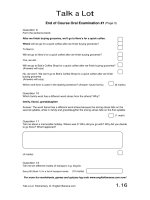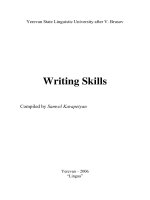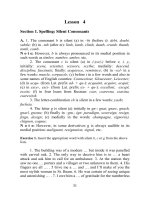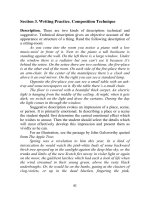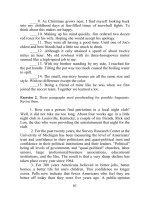Tài liệu Developing writting skills 1 part 3 doc
Bạn đang xem bản rút gọn của tài liệu. Xem và tải ngay bản đầy đủ của tài liệu tại đây (199.29 KB, 10 trang )
Exercise 3. Complete the sentences, using the pattern with emotional
should.
1. It is surprising … . 2. Isn’t it curious … . 3. It seems
remarkable … . 4. It is proper … . 5. It seemed right … . 6. Is it
natural … . 7. Isn’t it fortunate … . 8. It was most unusual … . 9. It
looked funny … . 10. It is quite evident … . 11. Isn’t it wonderful …
. 12. It is doubtful … . 13. It is a pity … . 14. It was a shame … .
Exercise 4. Use the appropriate means of emphasis in the following
sentences. Then make up similar sentences. (The items to be emphasized
are given in italics.)
1. Boys always fight. 2. She begged her father to let her go to
college but he did not want to listen to her. 3. Mary always came
over in the evening and played with us. 4. How odd that you have
brought this particular book. 5. He wanted no more letters but his
brother did not stop writing. 6. – I’m not quite sure whether the Boat
Race takes place tomorrow, though … - It takes place tomorrow. 7.
Last year’s spring tides caused much damage to property. 8. It is
scandalous that you are treated like that. 9. Life goes on. 10. I am
surprised that you have been deceived by such a trick. 11. It is
shocking that people live in such overcrowded slums.
Section 3. Writing Practice. Unfinished Stories
Normally students are required to complete the unfinished
stories, trying to imitate their style (herein unfinished stories are
similar to reproductions). However, the stories may also be used as
exercises combining reproduction practice with creative writing.
Exercise 1. Complete the following passage using the key words and
phrases provided or inventing something of your own. Pay attention to the
use of articles. Find a suitable title for your story.
I had been invited to a New Year party by my old school friend
Peter, who is now at art school. The party was to be held in the flat of
21
his fellow-student and we were to meet there at 11:30. Knowing
neither the host nor any of the people that were to be present, I felt a
little nervous about going but Peter assured me there was nothing to
worry about. He promised to come a little before 11:30, so as to be
there when I arrived.
Peter’s friend lives in a new suburb, and I had quite a job
finding the block of flats, as there were few people about, mostly
strangers themselves. In the end it was nearly 12 o’clock when I rang
the bell of Peter’s friend’s flat, or what I thought was his flat.
(door flung open – ushered into large room – young people round
table – no Peter – about to drink to the Old Year – glass pressed into
my hand – toast to the New Year – hostess showed me to the flat I
wanted – met with loud cheering – told of adventure).
Exercise 2. Using your imagination or drawing on your friends’ experience,
complete the following story. Find a suitable title for it.
The train was quickly gathering speed. I sat looking out of the
window until the last twinkling lights of the town had disappeared,
giving way to moonlit fields stretching away on both sides of the
railway line. It was after midnight and as we were to arrive in
London early the following day, I thought I might as well turn in. I
was just about to go and get my bed-linen, when I saw the attendant
coming along collecting the tickets. So I opened my bag to get mine
ready for him. ...
22
Lesson 3
Section 1. Spelling
A. Mute Final e.
R u l e 1. Final mute e is usually dropped before a
suffix beginning with a vowel letter; otherwise it would make two
consecutive vowels: guide – guidance, amuse – amusing, fame –
famous, refuse – refusal. But: age – ageing.
N o t e 1. E is retained to show pronunciation in such words as:
courage – courageous, advantage – advantageous, service –
serviceable.
N o t e 2. E is also kept after o: toe – toeing, shoe – shoeing, canoe
– canoeing, tiptoe – tiptoeing.
N o t e 3. Verbs ending in –ie change the –ie into –y before –ing to
avoid a double i: die – dying, tie – tying, lie – lying.
N o t e 4. Double e (ee) is retained before all suffixes except those
beginning with e (-ed, -er, -est): agree – agreeable, see – seeing.
N o t e 5. Rule 1 is not strictly observed in the case of monosyllabic
words when they are not likely to be misread: likeable, saleable or
likable, salable.
R u l e 2. Mute e is retained before a suffix beginning with a
consonant (to keep the pronunciation): safe – safely, nine – nineteen,
whole – wholesome, care – careful.
Exceptions to the rule: due – duly, true – truly, whole – wholly,
argue – argument, nine – ninth.
Exercise 1. Fill in the blanks with the appropriate word given in the list
below, adding the suffix –ly: Translate into Armenian.
(mere, rare, true, vague, extreme, late, due, entire, affectionate,
complete, whole)
1. Aunt Leonora came back from the kitchen, instantly seized
Herr Untermeyer … by the arm and led him to the window. 2. I
paused once, looking back, to offer my help, but Mr Wilbram
seemed … to be sunk in thought. 3. I loved the expression she used;
but if it was intended to improve the troubled atmosphere, it failed …
4. Since Dinny said no further word on the subject occupying every
23
mind, no word was said by anyone; and for this she was … thankful.
5. “Anyway,” she said, with one of those charming and …
unexpected turns of mind, “Who’s for cheese?” 6. “We are … sorry
to give this trouble,” said Colonel Schroff. 7. Then Mr. Barker
appeared and showed him into the room, a comfortable room with
lunch ready on the table and another table, … bare, evidently waiting
for him to spread his papers on it. 8. One day he was called to the
manager’s room, … reprimanded, and evidently pardoned in
consideration of his long and faithful service. 9. I have a friend who,
after an absence of many years, has … settled down in London, with
a wife, a cat and a garden. 10. Strange faces smiled … . 11. Her
interests were narrow, and she … journeyed farther than the corner
grocery.
Exercise 2. Add the suffixes given in brackets to the underlined words.
Translate into Armenian.
1. The dog’s master appeared, the beam of a flashlight dance(-
ing) before him. 2. I may as well mention here that she made an
advantage(-ous) match with a wealthy, worn-out man of fashion. 3. It
wasn’t from that dinner he remembered her, it was from notice(-ing)
her in the street. 4. Glance(-ing) at his companion, he wondered if
she also remembered it. 5. The only notice(-able) thing about his
appearance was the way his silver hair and beard contrasted with the
dark tan of his skin. 6. He knows the boy is very courage(-ous), but
he is also young. 7. But most people are afraid of face(-ing) this part
of their nature. 8. The few soldiers in the streets were grey-faced and
tired-looking … One thing was notice(-able): they never seemed to
laugh. 9. The mechanic, who is extremely knowledge(-able) about
any kind of machinery, knew exactly how to get the gate open.
B. Final –y and its Modifications.
R u l e 1. Words ending in –y
preceded by a consonant change –y into –i before all endings except
–ing: dry – dries, forty – forties, cry – cried, carry – carriage, clumsy
– clumsier, pity – pitiful, happy – happily, merry – merriment. But:
drying, crying, frying, applying.
N o t e 1. Words ending in –y preceded by a consonant drop the –y
before suffixes beginning with –i, -ic, -ical, -ism, -ist: economy –
24
economic; history – historic, historical; geology – geological,
geologist.
N o t e 2. Final –y is retained:
(a) in personal names: Mary – Marys, Gatsby – the Gatsbys;
(b) in some words before the suffixes –hood, -ish, -ist, -like, -
thing: babyhood, copyist, ladyship, anything, everything;
(c) in some monosyllabic words before –er, -est, -ly, -ness:
shy – shyer, shyest, shyness; sly – slyer, slyest, slyly,
slyness; dry – dryly, dryness (both forms are possible in
dryer – drier, flyer – flier).
N o t e 3. Final –y changes to –e before –ous: piteous, beauteous,
plenteous, duteous.
R u l e 2. Final –y preceded by a vowel letter is retained before all
suffixes: day – days; play – playful; pay – pays, payment; enjoy –
enjoyable.
Exceptions: gay – gaily, gaiety; day – daily.
Exercise 3. a) Form adverbs from the following adjectives:
busy, lazy,
gay, sly, heavy, dry, happy, merry, shy, ready, lucky, icy, easy, tidy,
pretty, angry.
b)
Give the comparative and superlative forms of the following adjectives:
early, happy, witty, gay, grey, dry, shy, sly, easy, busy.
c)
Give the plural of the following nouns:
day, country, beauty, joy,
reply, irony, monkey, baby, lady, story, body, boy, hobby.
d)
Write down the forms of the third person singular of the Present
Indefinite and the Past Indefinite of the following verbs:
dry, play, cry,
stay, try, delay, comply, betray, destroy, fry, repay, copy.
Exercise 4. Write out from a dictionary all the words derived from the
following words and choose a suitable derivative to fill in the blanks:
(rely, pay, deny, history, angry, essay, day, happy, shy, marry,
mercy, apply, clumsy, industry)
1. I wish you all the … in the world. 2. He was well aware that
this particular debt demanded prompt … . 3. The bride’s parents did
25
